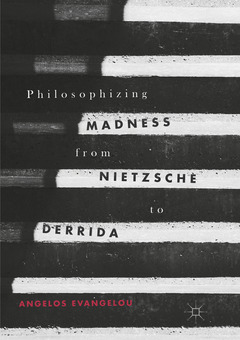Description
Philosophizing Madness from Nietzsche to Derrida, Softcover reprint of the original 1st ed. 2017
Author: Evangelou Angelos
Language: English
Subjects for Philosophizing Madness from Nietzsche to Derrida:
Publication date: 05-2018
Support: Print on demand
Publication date: 08-2017
Support: Print on demand
Description
/li>Contents
/li>Biography
/li>Comment
/li>
Drawing connections between madness, philosophy and autobiography, this book addresses the question of how Nietzsche's madness might have affected his later works. It also explores why continental philosophy after Nietzsche is so fascinated with madness, and how it (re)considers, (re)evaluates and (re)valorizes madness. To answer these questions, the book analyzes the work of three major figures in twentieth-century French philosophy who were significantly influenced by Nietzsche: Bataille, Foucault and Derrida, examining the ways in which their responses to Nietzsche?s madness determine how they understand philosophy as well as philosophy?s relation to madness. For these philosophers, posing the question about madness renders the philosophical subject vulnerable and implicates it in a state of responsibility towards that about which it asks. Out of this analysis of their engagement with the question of madness emerges a new conception of 'autobiographical philosophy', which entails the insertion of this vulnerable subject into the philosophical work, to which each of these philosophers adheres or resists in different ways.
Chapter 1: The ‘Nietzsche Event’: Madness and the Limits of Becoming.- Chapter 2: Georges Bataille: Madness and the ‘Ethics of Vulnerability’.- Chapter 3: Michel Foucault: Madness and Philosophical Incapacity.- Chapter 4: Jacques Derrida: Philosophy Opens Up to Madness.- Conclusion: Responding to Madness: ‘Autobiographical Philosophy’.
Presents new perspectives on the work of Nietzsche, Bataille, Foucault and Derrida
Offers a unique understanding of the many facets of madness and philosophy
Opens up philosophical thought to autobiographical intervention
Includes supplementary material: sn.pub/extras
Includes supplementary material: sn.pub/extras

